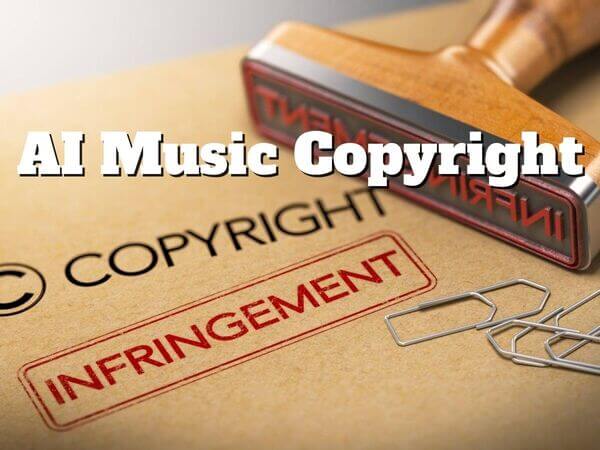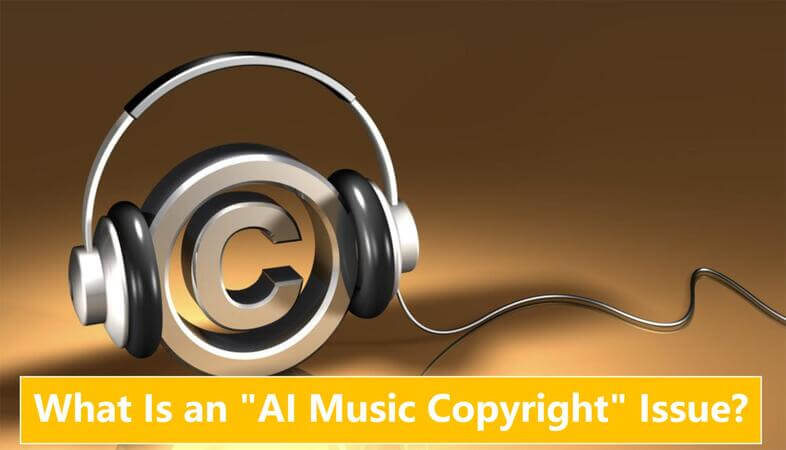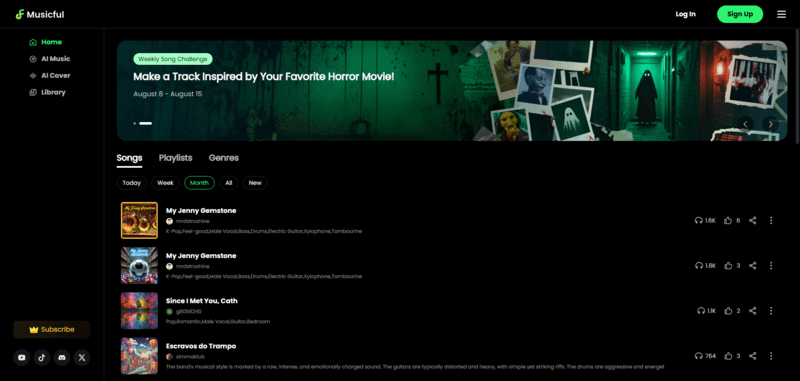Nov 20, 2025
5 min read
AI music copyright is one of the most confusing topics for today's creators. People often ask: Can you copyright AI music? Is AI-generated music copyrighted? Who owns AI music?
Here is a clear, law-based explanation.

Part 1. What Counts as AI-Generated Music?
AI-generated music refers to any track created with help from an AI system. In practice, it falls into three main categories:
1. Fully AI-generated music
The AI creates the melody, harmony, arrangement and mix directly from a prompt, with little or no human involvement.
2. AI-assisted music
A human contributes lyrics, chords, melody or structure, while the AI supports arrangement, instrumentation or production.
3. Transformative AI workflows
Processes such as style transfer, stem reconstruction or AI voice cloning used to reinterpret existing material.

Why this distinction matters
Copyright rules depend on how much human creativity is present. This is why creators often ask:
● Is AI music copyrighted?
● Who owns AI-generated music?
● Can AI outputs cause copyright infringement?
These three questions form the core of AI music copyright, covering protectability, ownership and potential legal risks.
To understand how copyright applies, the next section addresses the most important question directly: Can AI music be copyrighted?
Part 2. Can You Copyright AI Music?
This is the most common question creators ask: "Can you copyright AI music?"
The short answer is:
1. Fully machine-generated music cannot be copyrighted.
2. Music with meaningful human creative input can qualify for protection.
1. When AI music is not eligible for copyright
● The track is generated entirely by an AI system
● No human creativity or decision-making is involved
● Outputs come directly from a prompt with no further edits
Global copyright rules require an element of human authorship, and without it, the work is not considered protectable.
2. When AI music may be copyrighted
If you contribute original creative elements - such as writing lyrics, composing melodies or substantially editing the AI output - your human contribution may qualify for copyright.
Evidence of your work (drafts, stems, edit history) can help establish authorship in case of disputes.
3. How major regions interpret AI music copyright
● Modern copyright law protects original expression by a human. The U.S. Copyright Office(USCO) states that works with more than de minimis AI-generated material must disclose it; only the human-authored portions are registrable. Purely machine-generated outputs are not protected.(U.S. Copyright Office)
● U.S. courts have now affirmed this: in Thaler v. Perlmutter(D.C. Cir. 2025), the court held that a work must be authored by a human to qualify for copyright.
● Europe focuses on "the author's own intellectual creation" as the originality test—again tying protection to a human creator's choices.
● Japan allows broad AI data usage but maintains that only human-generated elements qualify for copyright.
Bottom line: To strengthen your claim, always ensure human authorship is visible in the final track and keep records of your process.
Part 3. Infringement and Risks: AI Music Copyright Infringement / Issues
While many users focus on "Can I copyright my AI track?", another key concern is: Can AI music infringe someone else’s copyright?
1. Similarity to existing songs
AI models sometimes generate melodies or harmonic progressions that resemble existing copyrighted works.
Risk: If a track is found "substantially similar," platforms like Spotify or YouTube may issue takedowns or block monetisation.
2. Voice cloning without consent
AI-generated vocals that imitate a real artist's voice can violate:
1. Performer rights
2. Publicity rights
3. Personality rights
This can lead to account suspension or legal claims from rights holders.
3. Platform licensing and contract restrictions
Even if you "create" the music, your rights depend on the AI platform’s Terms of Service.
Example risks:
1. Using a non-commercial licence for commercial publishing
2. Violating usage restrictions on AI-generated vocals
3. Ignoring regional copyright limitations on AI works
Why these risks matter
● Financial loss: Damages, legal fees and loss of streaming revenue
● Distribution loss: Major platforms may remove infringing tracks
● Reputation damage: Accusations of copying or unauthorised voice use harm professional credibility
AI music offers creative freedom but creators must understand these risks to publish safely.
Part 4. Copyright and Ownership on Musicful
If you want a platform with clear rules around ownership and usage, Musicful provides one of the most transparent frameworks.

Ownership and copyright on Musicful
● Free / Basic Plan: Only non-commercial use; ownership stays with Musicful.
● Standard / Pro Plan: Commercial use allowed; ownership goes to the user.
● Important note:
Some regions may still question the copyright validity of music with a high AI contribution.
However:
● Lyrics you write yourself
● Melodies you compose
● Edits you apply
are typically protected as human-authored elements.
Musicful, with over one million registered creators, offers a safe way to explore AI-assisted music creation while maintaining clear rights over your work.
Conclusion
Is AI music copyrighted? Laws are still unclear, and each region handles AI music differently. In general, the more human creativity you add - lyrics, melodies or meaningful edits - the stronger your copyright position becomes.
Ownership depends on the platform you use, and infringement risks can lead to real financial and reputational damage. To create safely, understand the rules where you publish and check how your AI music generator handles copyright.
Commercial-use Music Here


